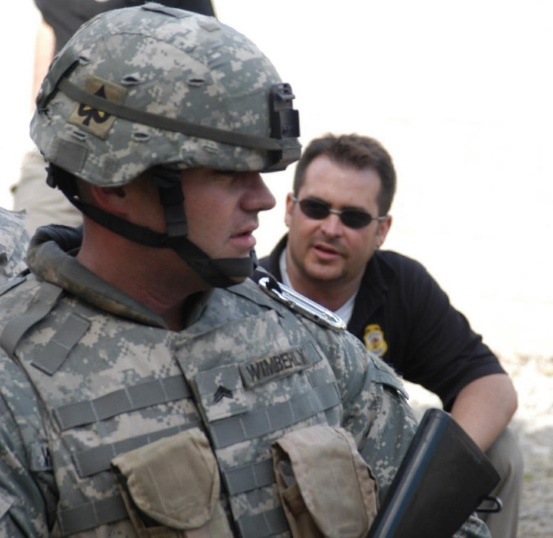
Imagine working as a criminal investigator in Baghdad, Iraq, and attempting to use forensic science to work crime scenes in hostile combat environments with limited resources. Further, imagine trying to teach these same techniques to law enforcement officers in Botswana, Africa, where resources are insufficient in a country formally listed as one of the poorest locations on earth. It would seem impossible to accomplish. But Michael Hullihan, Jr. did it. Not only that, but he helped to build a blue bridge between American and African law enforcement.
Henri Matisse, an icon of French painting, said, “Creativity takes courage.” Throughout his life, Hullihan has displayed the courage to facilitate working crime scenes and collecting evidence in many harsh environments. During his tour in Iraq, Hullihan worked as a Forensic Intelligence Analyst with the Army National Ground Intelligence Center (NGIC) assigned to the Combined Explosives Exploitation Cell (CEXC).
“While in Iraq,” said Hullihan, “my fellow soldiers and I developed expedient ways to carry and deploy minimal equipment while collecting the maximum amount of evidence.”
Hullihan’s skills carried over to the civilian world as he served ten years as a criminal investigator and forensic examiner with the Glynn County Police Department, Brunswick, Ga. From there, he advanced his career with the federal government as the senior instructor and class coordinator for the photography programs in the Forensic and Special Investigative Skills Branch, Investigative Operations Division at the Federal Law Enforcement Training Center (FLETC) located at Glynco, GA.
In 2015, Hullihan’s creative abilities were called upon as he traveled to the International Law Enforcement Academies (ILEA)-Gaborone in Botswana, Africa, to train African law enforcement. According to the Department of Homeland Security (DHS), “On July 24, 2000, in view of their long-standing and close cooperation in law enforcement regarding their mutual interest in combating transnational crime, the United States and the Botswana governments entered into an agreement for establishing an International Law Enforcement Academy that provides training for middle managers from eligible countries in sub-Saharan Africa.”
The conditions in Botswana offer unique challenges to instructors. Marked by a subtropical desert climate, Botswana has vast differences in day and night temperatures and the seasons are opposite of America’s (safaribookings.com, 2017).
Although growing, the country still lacks the technology and education found in the U.S. According to BBC News, Botswana was formerly one of the poorest countries in the world with the highest rate of AIDS. But, since the discovery of diamonds, living conditions have improved.
Per the chief of the Leadership and International Training Division (FLETC), Ariana Roddini, “While FLETC’s first mandate will always be training federal law enforcement, we recognize the interconnectivity between our mission and the goals of domestic and foreign law enforcement.” (FLETC Journal, 2015)
Roddini further highlighted the need for a blue bridge between nations by stating, “The transnational nature of the criminal forces we face and the threat they pose to our society require that we work closely together.”
Experienced with the transnational nature of crime, Hullihan walked into a world that was vastly different than the one he grew up in at his home Louisiana. Dusty streets with cattle, limited access to electricity, and little or no equipment, Hullihan’s creative talents were stretched beyond those displayed on CSI and NCIS.
Upon arrival in Botswana, Hullihan’s first challenge was communicating with his students. An example of bewilderment was first apparent while teaching fingerprinting techniques. Hullihan said he noticed confusion on his student’s faces as he referred to a “water jug” as a “pitcher.” Understanding an enormous amount of substance gets lost in translation, Hullihan knew his English dialect differed from their version of the language. To overcome this challenge, Hullihan devised a technique of listing terms on a whiteboard that served as a legend to track words that did not immediately translate.
In addition to the challenge of communication, Hullihan’s creative talents were employed again, as he had to develop non-traditional techniques for working crimes scenes. Without traditional methods and no available electricity, Hullihan taught his students to use whatever resources were available to them to process a crime scene. Using sticks, bags, boxes, bottle caps and tin cans, Hullihan found ways of implementing common trash dump items as tools for processing evidence. To process latent fingerprints using the “super glue” fuming technique, Hullihan trained his students to use the “cotton ball” method to overcome the lack of electricity typically used in “super glue” fuming.
According to Hullihan, “This effort to identify innovative solutions to overcome limited resources extends throughout the training program. … One of the most gratifying aspects of an instructor position at FLETC is the significant impact our instruction has on countless individuals.”
To sum it up, Hullihan said, “You must understand, their daily issues are not our own. Robbery, homicides, and drug use are our issues. Africans suffer from severe political corruption, lack of resources, and exploitation of their natural resources by evil entities, such as rhino and elephant poaching, and problems with their gold and diamond mines. Speak to their concerns, and you will always win the communication gamut.”
Michael Hullihan, Jr. continues this day to teach at FLETC and travel wherever his set of skills can be used to build blue bridges training law enforcement in America and abroad.










0 Comments